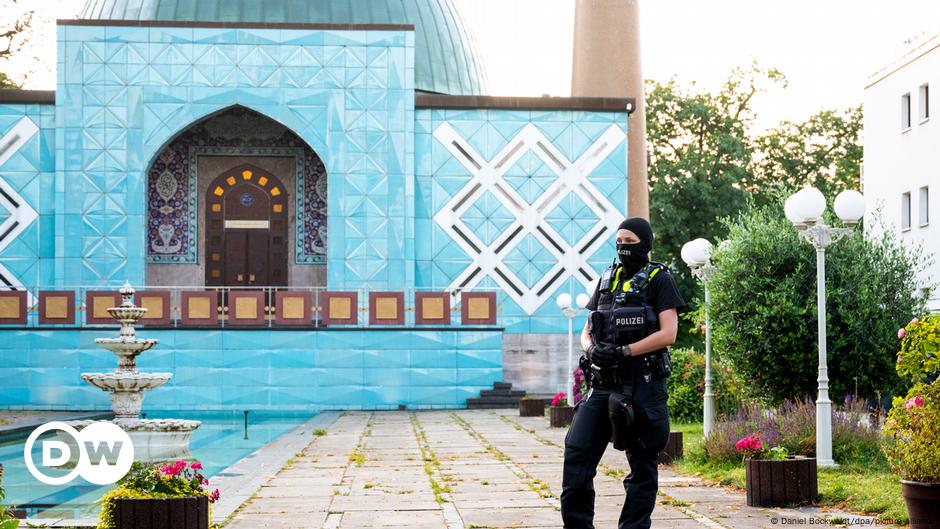The Islamic Center Hamburg (IZH) was under investigation for several months over its alleged support for Lebanon’s Hezbollah group which is backed by Iran. Hezbollah is classified as a terrorist group by Germany.
German Interior Minister Nancy Faeser said on Wednesday that the Islamic Center Hamburg (IZH) would be banned for propagating extremism and that its famous “Blue Mosque” was being searched by police.
“It is very important to me to make a clear distinction here: we are not acting against a religion,” Faeser said, but just against a group accused of undermining the German state as well as women’s rights.
The Imam Ali Mosque, known locally as the Blue Mosque, is one of Germany’s oldest mosques and is operated by the IZH.



§3 VereinsG. It’s not ministers which do it, but ministries. Huge difference. They’re shutting down associations with the same kind of authority and procedure as they’re shutting down restaurants which fail to adhere to hygiene standards, and in the same way: Based on established rules and procedures which are based in law. As a minister, you can’t just say “hey close that restaurant there I don’t like their food”, that’s not how it works. Best you can do is “hey that restaurant over there, have a look at it”. Also this is a co-decision of the federal and Hamburg’s ministry of the interior.
Here’s the announcement part, the explanatory statement is not public, if you want to get it you can ask the IZH they got a copy.
I might be mistaken but I don’t think they’re even confidential, they’re just not automatically published. It might be as simple as sending a freedom of information request.
As you can notice the thing isn’t even signed by the minister, but a civil servant.
Oh my. Hamburg wanted the thing outlawed for ages, they’ve had a very keen eye on all kinds of Islamists ever since 9/11 (remember where Muhammed Atta studied?) but as the IZH is not only active in Hamburg but also other states they couldn’t do it on their own, the federation needed to move. And they took their sweet time, only ever starting to get moving about two years ago after the crackdown on protests in Iran (the IZH is Iran-affiliated).
In case you’re mildly conspiracy-minded, really more smart political strategy and not conspiracy: Increased vigour and urgency could have something to do with the looming AfD ban: They’re intent on getting all the Islamists etc. they have in the pipeline banned to avoid certain conspiracy narratives Nazis would no doubt start to spin. Great replacement theory BS.
…and yes that kind of prioritisation is something a minister can do. “Put the Hell’s Angels on the back burner for now and focus getting the paperwork for the Islamists done” is within their power.
Thanks for calling out that misinformation.
I think we’ve seen ministries mishandle investigations at the pressure of politically appointed ministers like Stark Watzinger with her Fördergeld Affäre trying to cut funding to researchers that don’t fit in her political agenda, or the case with Berlin’s Culture Minister/Senator that ended up cutting funding to a cultural center that then sued his office and won (https://www.rbb24.de/politik/beitrag/2024/07/berlin-joe-chialo-foerderstopp-oyoun-vorwurf-antisemitismus.html). I don’t think such cases should be admissible under a democracy, even a flawed one as ours. I don’t care if 4 out of 5 such orders are well intended, if 1 out of 5 exist because of political pressure. These institutions then have to fight their way through courts (while also being financially able to do so), while the state doesn’t have to use the courts at all. That can take ages. If the government wants to ban an organization, it should use the court system, and everything should be on the table. Closing down entire cultural institutions isn’t something as simple as “closing down some restaurant”. If Hamburg had this cultural center in view for so long, even years, why hasn’t it used the courts to close it down? It takes the same amount of time to take them to court after all.
This is what to me is concerning about Germany and especially German democracy.
And no, I won’t trade democracy for this supposed sense of “security” where governmental offices get to skip a ton of steps and political influence can poison the decision making.
Why is that? Why not publish your findings? And are you so sure about the fact that you can request them through a freedom of information act? I wouldn’t be
Granting funds is a political act in the first place, not directly comparable to outlawing an organisation. Completely different standards apply.
Hamburg couldn’t act alone because part of the association’s activity was outside of its jurisdiction.
I’m not even opposed in principle against making association bans a matter of the courts – but you didn’t actually argue in favour of it, either. Your examples concern funding, if all NGO funding went via the courts it’d completely overwhelm them, you didn’t give an example of a mistaken ban. Also note how damaging those kinds of things are to politicians. And you can bet your arse that when such stuff is happening the press is getting a lot of anonymous tips as to what’s going on.
It’s also quite a bit easier to get an education ministry to stop funding something than to get a ministry of the interior, filled to the brim with legal experts and criminologists, to ban something without proper reason. I’m quite sure if you wanted to it’d be quite trivial to trick the forestry administration into buying shoddy telephones. Not their speciality.
Parties btw need to be banned not just by courts but even the constitutional court.
Indeed, why not publish? If the IZH thinks that it’s all bunk, why aren’t they publishing it?